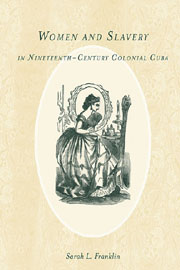Book contents
- Frontmatter
- Contents
- List of Illustrations
- Acknowledgments
- Introduction: Patriarchy, Paternalism, and the Development of the Slave Society
- 1 Virgins and Mothers
- 2 Wives
- 3 Pupils
- 4 The Needy
- 5 Wet Nurses
- Conclusion: A Shifting Landscape
- Abbreviations
- Notes
- Bibliography
- Index
- Rochester Studies in African History and the Diaspora
1 - Virgins and Mothers
Published online by Cambridge University Press: 05 February 2013
- Frontmatter
- Contents
- List of Illustrations
- Acknowledgments
- Introduction: Patriarchy, Paternalism, and the Development of the Slave Society
- 1 Virgins and Mothers
- 2 Wives
- 3 Pupils
- 4 The Needy
- 5 Wet Nurses
- Conclusion: A Shifting Landscape
- Abbreviations
- Notes
- Bibliography
- Index
- Rochester Studies in African History and the Diaspora
Summary
It is very certain that the natural law of society, in accord with moral religion, destines that man everywhere, from the isolated family to the most extensive empire, be jefe and head of all.
—Don Manuel Pérez de Oliva, “Oración Fúnebre de la Católica Reyna,” 1819The dramatic changes wrought by the escalation of plantation slavery in the wake of the Haitian Revolution would alter the role and place of women in Cuban society as traditional elites employed patriarchy to assure the maintenance of order. Yet, patriarchal standards require foundation. Society's prescriptions for women were closely tied to marianismo, or the idea that women are morally and spiritually superior to men, and the veneration of women, religion, and motherhood played an important role in those prescriptions. Women were, in short, subordinate to fathers and husbands, and to God, a notion widely held in Hispanic America. Nonetheless, social mores for women in the Spanish American colonies were not uniform. In Cuba, where the plantation society would reach heights unparalleled elsewhere in Spanish America, the nature of women's subordination would have a distinctly local context.
A Religious Foundation
In a slave society such as Cuba where the subordination of one group to another is required, Catholicism is a useful tool for imposing and maintaining hierarchy and social order. Catholicism places one woman, Mary, quite near to God, and she occupies an important role in the Catholic faith, and did so in Cuba in the nineteenth century.
- Type
- Chapter
- Information
- Women and Slavery in Nineteenth-Century Colonial Cuba , pp. 21 - 37Publisher: Boydell & BrewerPrint publication year: 2012

